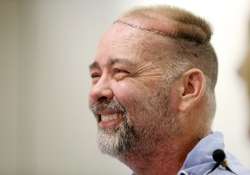First skull-scalp transplant performed by US doctors
Houston: World's first skull-scalp transplant was performed by American surgeons on a man who suffered a large head wound from cancer treatment, a major breakthrough in transplant surgery.MD Anderson Cancer Center and Houston Methodist Hospital

Houston: World's first skull-scalp transplant was performed by American surgeons on a man who suffered a large head wound from cancer treatment, a major breakthrough in transplant surgery.
MD Anderson Cancer Center and Houston Methodist Hospital doctors announced on Thursday that they did the 15-hour operation on May 22 at Houston Methodist.
James Boysen, a 55-year-old software developer from Austin, received the craniofacial tissue transplant at the same time as a kidney and pancreas transplant at Houston Methodist Hospital in surgeries that lasted nearly a day.
A photo of Boysen after the surgery shows him with sutures in a ring around the top of his head, about 2.5 cm above his ears, where the transplanted skull and scalp were attached.
The man who led the plastic surgery team, Dr Michael Klebuc, told media that it was a very complex microvascular procedure. "We transplanted missing skull bone in the overlying hair bearing scalp — not just that tissue but the nutrient blood vessels that come with it," he said.
"Boysen is showing some early sensation which is quite extraordinary. The other thing that's interesting is that you can actually see him perspire on the scalp now that it's been transplanted," he said.
"This kind of a triple transplantation has never been reported before and to our knowledge no-one has reported just the skull and the scalp as well," Klebuc said.
"He (Boysen) had a series of cancers of the scalp and skull that were treated with various surgeries and radiation that left him with a large wound that was all the way down to his brain," said Jesse Selber, a reconstructive plastic surgeon who was the co-leader of the team that performed the intricate surgery.
Boysen had a kidney-pancreas transplant in 1992 to treat diabetes he has had since the age of five and has been on drugs to prevent organ rejection.
The immune suppression drugs raise the risk of cancer, and he developed a rare type - leiomyosarcoma. Radiation therapy for the cancer destroyed part of his head, immune suppression drugs kept his body from repairing the damage, and his transplanted organs were starting to fail - "a perfect storm that made the wound not heal," Boysen said.
"I'm amazed at how great I feel and am forever grateful that I have another chance to get back to doing the things I love and be with the people I love," Boysen said after the surgery.